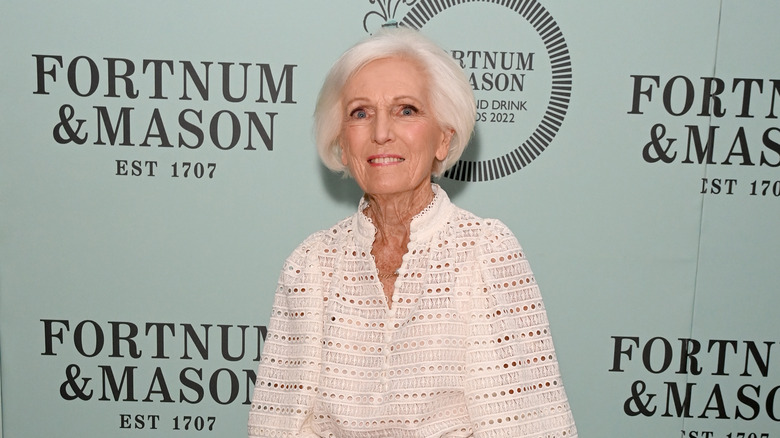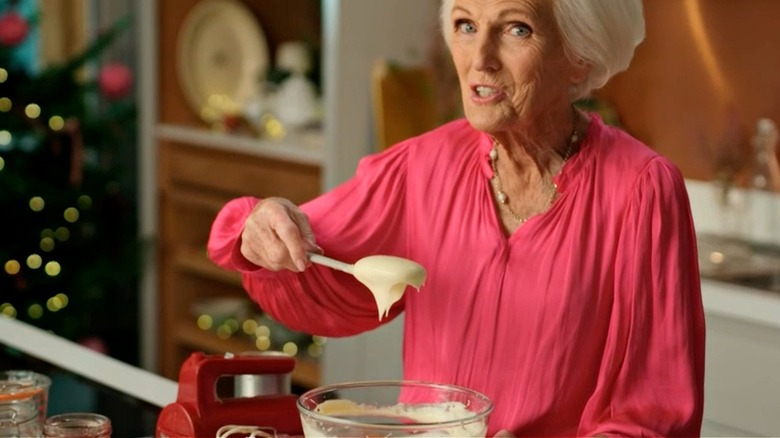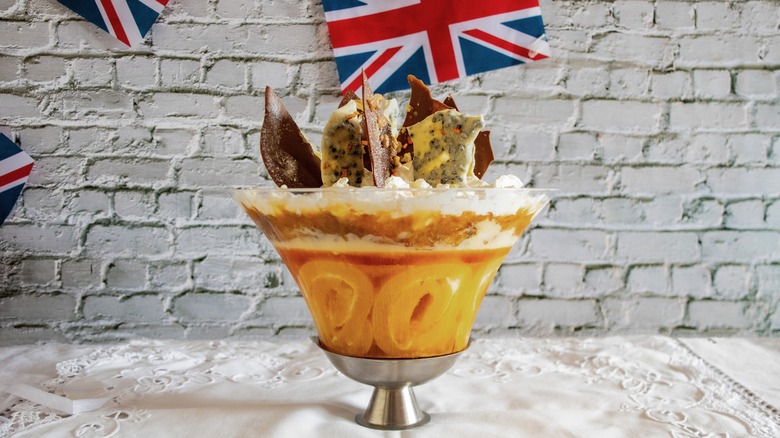The Canned Shortcut Mary Berry Insists On For Trifles
Although for some folks Mary Berry may be best known as a judge on "The Great British Baking Show," she's been a food-world fixture for 60 years with more than 80 cookbooks to her name. Berry trained at Paris' famous Le Cordon Bleu, but that doesn't translate to her being fussy in the kitchen. The "doyenne of baking," as PBS calls her, isn't above using premade ingredients in some of her recipes to save time and trouble, especially when it comes to trifles.
A traditional British trifle typically includes custard, whipped cream, sherry or brandy, jam, sponge cake, and sometimes fruit. It's traditionally served during the holidays in the U.K., along with British pudding, which is not the same as American pudding. Berry's use of premade ingredients, from canned pears to maraschino cherries, isn't all that wild. The original idea behind these classic English desserts was to use up what you had lying around to create delicious and festive layered treats. And for the key ingredient, Berry often goes with canned custard rather than making it from scratch. "It's the best type of custard for trifle making, and then I make it more luxurious by putting whipped cream in it," she told breakingnews.ie.
Berry's use of canned custard makes sense within the confines of the dessert's history. What's more, the way she incorporates it into her delicious trifles couldn't be quicker or easier.
Canned custard to the rescue
A traditional British custard is made from a combination of warm milk and cream, slowly whisked into a mixture of beaten egg yolks, sugar, and cornstarch. Once combined, vanilla extract is added, and then it's all heated in a saucepan until just below boiling. While custard is relatively easy to make, it's also easy to botch. If you take your eyes off the pot for too long or fail to stir continuously while it's on the stove, it can quickly turn grainy from overcooking. Ending up with a thin custard is another potential trifle mishap that comes from undercooking.
In Mary Berry's PBS special from 2022, "Mary Berry's Ultimate Christmas," she forgoes the homemade custard in favor of the store-bought kind. Besides being a time saver, canned custard is nice and thick, but Berry makes it even richer by folding in double cream. If you can't get your hands on any double cream, the closest substitution is a mixture of milk and melted butter (¾ cup and ¼ cup, respectively, in place of each cup of heavy cream). That being said, Berry sometimes opts to make homemade custard for her trifles. In her version of a tipsy trifle, which she showcased on the second episode of "The Great British Baking Show Masterclass," she insists on it. To see whether the canned stuff can hold its own against the homemade version, you'll have to make trifles with both kinds of custard and compare the results.
From leftovers to legendary
The origins of this sweet treat stretch back hundreds of years, and during that time, the trifle has undergone profound changes. In the 16th century, it was made from cream, rosewater, ginger, and sugar. Two hundred years later, the dessert began to resemble something closer to what we think of as a trifle, incorporating sweet-wine-soaked almond cookies, custard, and whipped cream.
By the time of the Victorian era (1819 to 1901), the trifle had taken on its modern form, although it was more about using leftovers than anything else. ”In Victorian times, it was regarded as a way of finishing up things, like sponge cakes and cream,” author and food historian Jane Howard told The New York Times in 1988. Over the years, the British elevated the trifle to a grander dessert, and Mary Berry, through her variations on the dish, has helped. But she isn't above a quick fix or two, or using ingredients you're likely to have on hand. The beauty of the trifle is that it's relatively easy to make, allows for lots of creativity, and can be a great way to reduce food waste at home.


